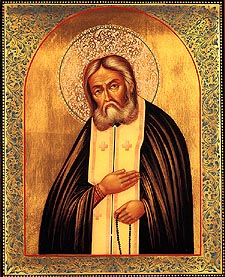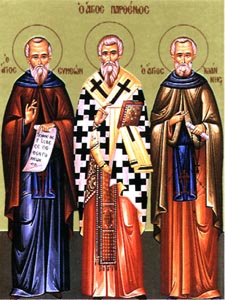|
|||
|---|---|---|---|
| This weekly bulletin insert complements the curriculum published by the Department of Christian Education of the Orthodox Church in America. This and many other Christian Education resources are available at http://dce.oca.org. | |||

Two saints who showed deep love for Christ by doing things that go far beyond what most people would be willing to do are remembered in the middle of the summer. The first is Saint Seraphim of Sarov. The Church celebrates the transfer of his relics from his original place of burial to the Church of Sts. Zosimus and Sabbatius, and then to the Dormition Cathedral in Sarov. Over 200,000 people paid their respects to the beloved saint, and numerous healings took place during the procession with his relics. We know many things about Saint Seraphim, including his wonder-working and his gentle companionship with wild animals. But one of the most unusual things we know is the story of what caused him to walk hunched over during the later years of his life. Saint Seraphim was working in his garden when he was attacked by robbers. Rather than defend himself or use his heavy garden tools to fight them off, he allowed them to beat him badly. It was after this incident that his injured back was permanently bent and affected his walk. For most people, the idea of not even trying to defend ourselves from an unjust attack is unthinkable. But Saint Seraphim's Christlike love for God's creatures made him unwilling to harm any of them, no matter what the circumstances. Saint John Chrysostom comments on a similar episode, when companions of Saint Paul didn't fight back against attackers: "For to endure when insulted is God's part: to be merely abusive, is the part of the devil...to them that beat us, let us return blow for blow, by meekness, by silence, by long-suffering..." The Venerable Simeon of Edessa served God by living as a fool-for-Christ. Like Saint Seraphim, though in a different way, he showed Christlike love that would be difficult for most people to manage. He called people to repentance by feigning madness. He would bound around crazily in the streets and approach people, whispering their sins in their ears and urging them to repent. Sometimes he appeared in dreams and reminded the dreamers to repent. To do this, of course, he had to have insight into people's deepest secrets, which he did.
Commenting on Saint Simeon in "The Prologue from Ochrid" Bishop Nikolai Velimirovich writes about Lycerges, the king of Sparta, who set down strict laws and got his citizens to promise to obey them while he was away for a protracted period of time. Having secured their agreement he left, and never returned, thus "binding them to their oath forever." Lycerges' willingness to leave his country forever was a sacrifice for the good of the Spartan people, Bishop Nikolai writes: "But how much greater a sacrifice it is voluntarily to leave one's mind and always to appear before men as mad! Is not madness the greatest banishment known to man? And to live year after year in that state, and all in order to be of help to one's neighbour!" |
|||

